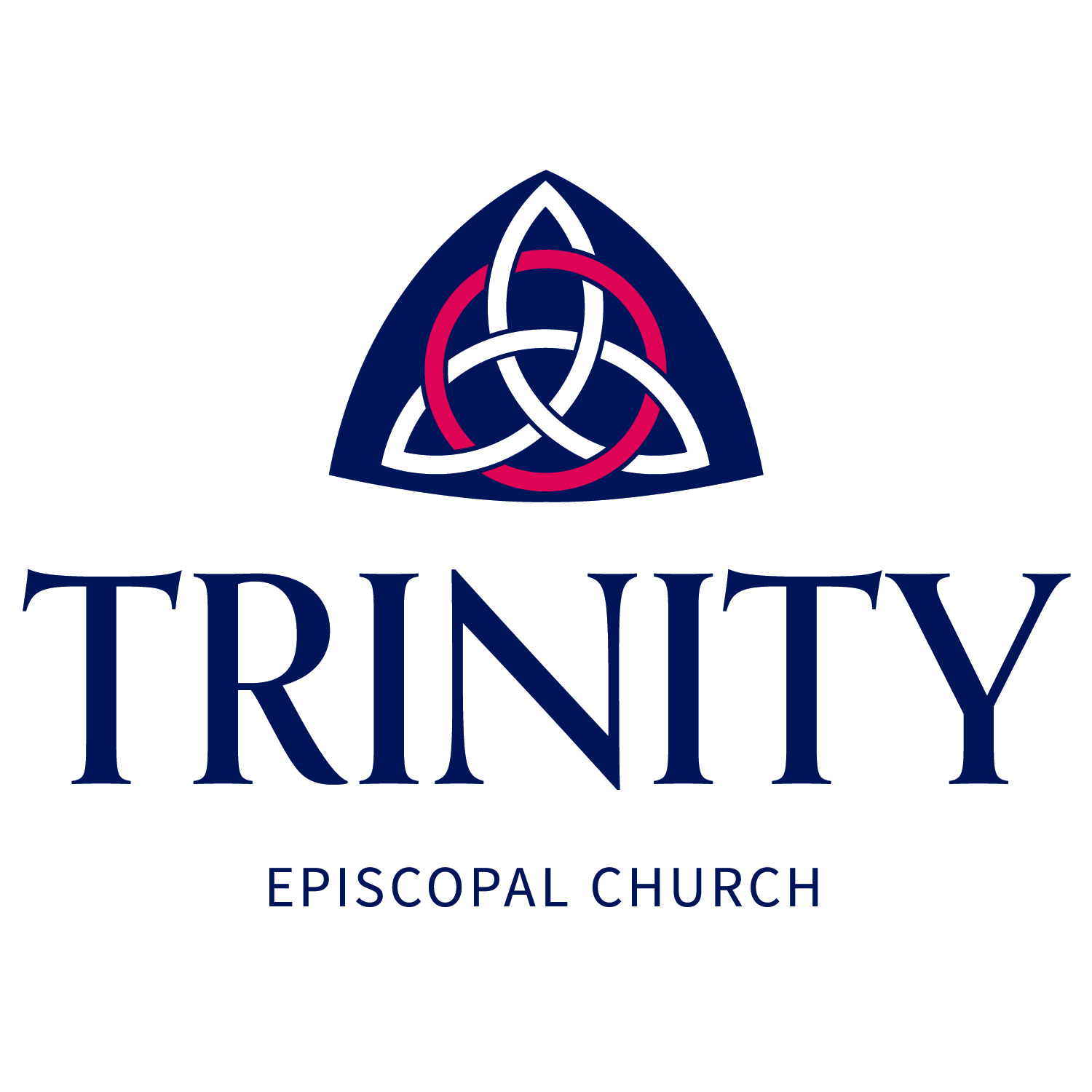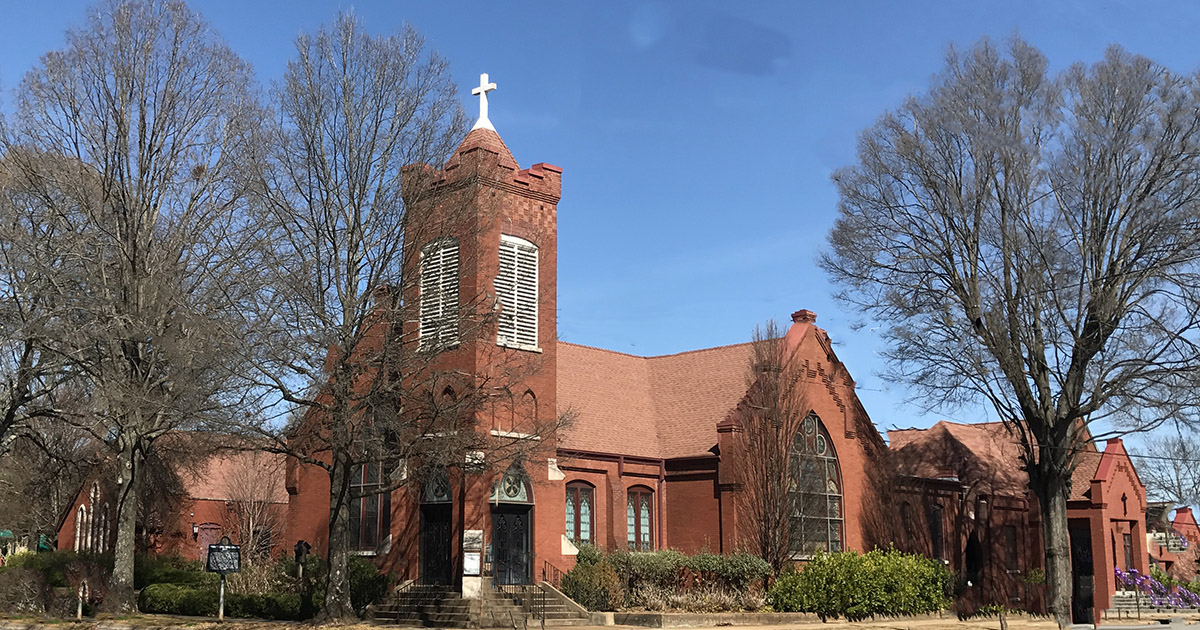
Welcome to the blog of Trinity Episcopal Church!
We are part of the Episcopal Branch of the Jesus Movement. We have been a worshipping community in Florence, Alabama since 1824, and our beautiful church has been at the corner of Pine and Tuscaloosa Streets since 1894. As part of the Episcopal Church, we are part of the Anglican Communion in the United States, descended from and partners with the Church of England and the Scottish-Episcopal Church.
What do we believe?
We believe in the loving, liberating, and life-giving God: Father, Son, and Holy Spirit.
We believe in following the teachings of Jesus Christ, whose life, death, and resurrection saved the world.
We have a legacy of inclusion, aspiring to tell and exemplify God’s love for every human being; men and women serve as bishops, priests, and deacons in our church. Laypeople and clergy cooperate as leaders at all levels of our church. Leadership is a gift from God and can be expressed by all people in our church, regardless of sexual identity or orientation.
We believe God loves you. No exceptions.
Want to learn more? Follow our blog…
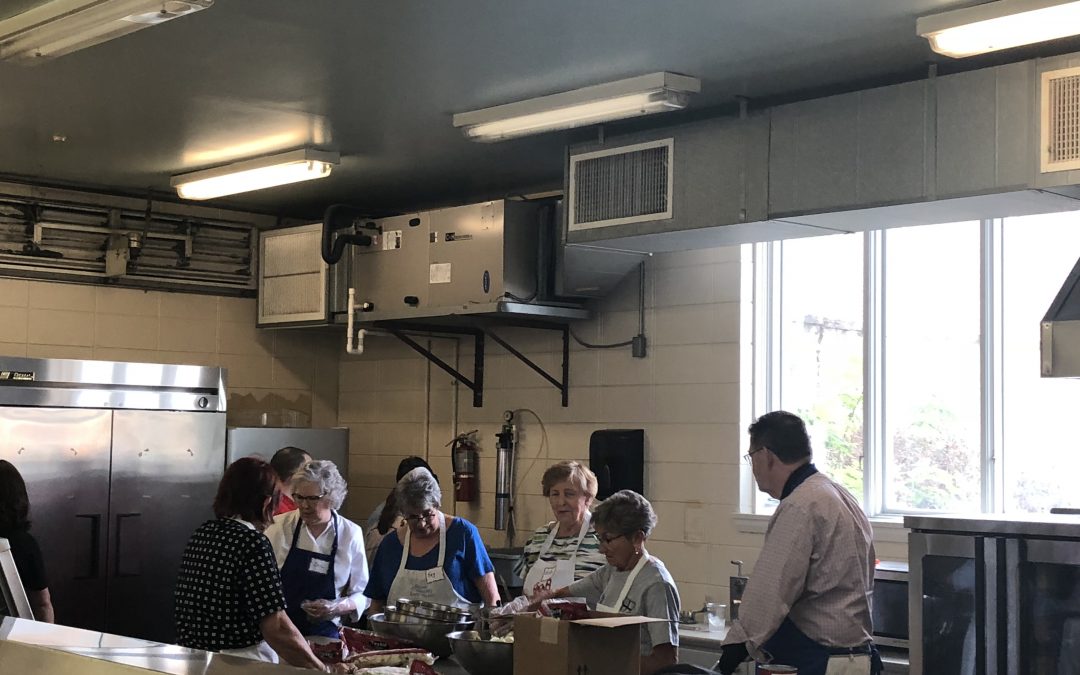
Room at the Table
Trinity had the privilege of being the first group to prepare a meal for Room at the Table on Monday, June 4th. While our cooking crew was much too busy for pictures, we did get a couple of pictures of our crew as well as the beautiful new tables and table settings. The thought is to make the experience at Room at the Table as much like a family gathering as possible with round tables, silverware on the tables, and simple, sweet touches all around.
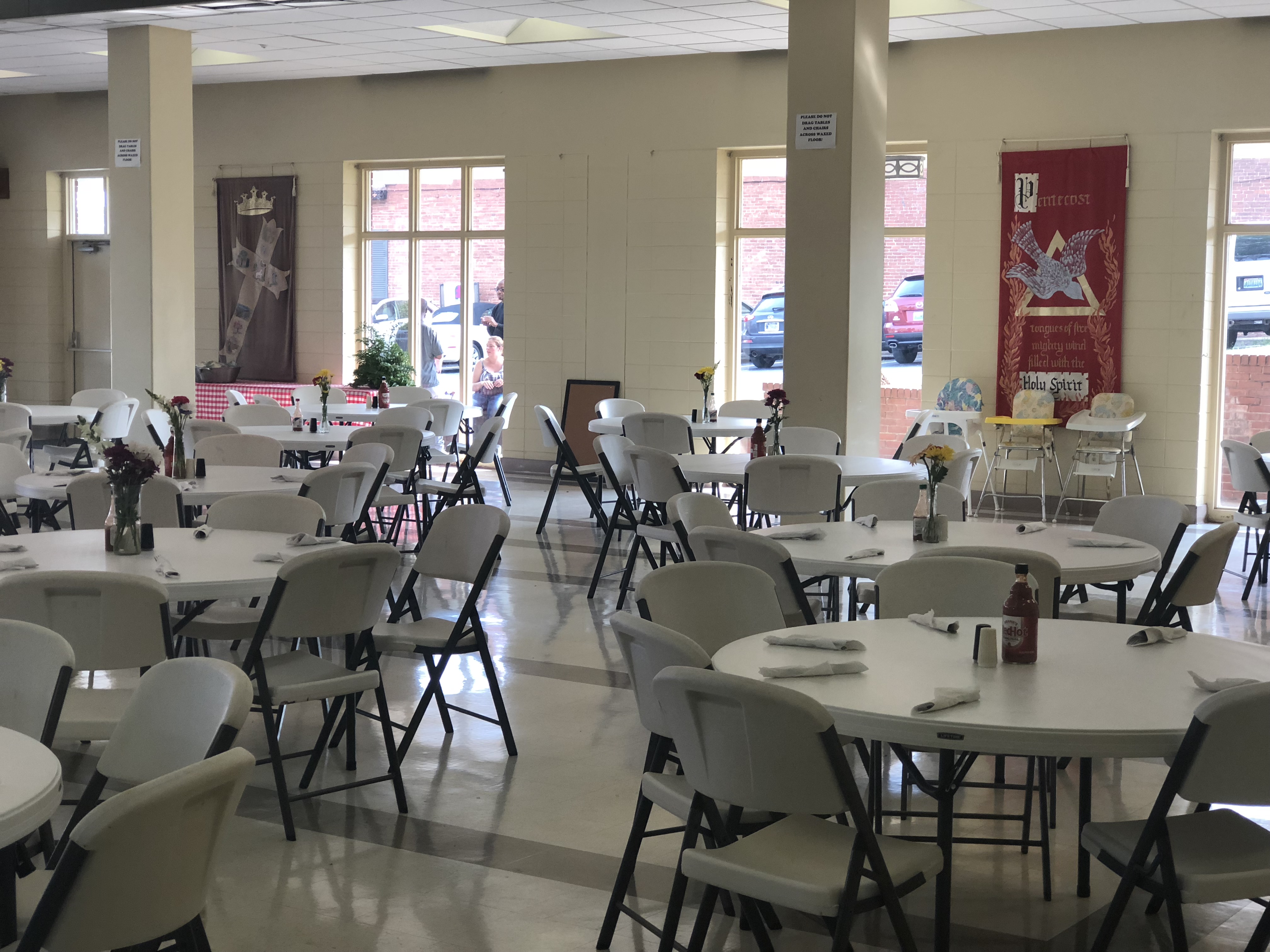
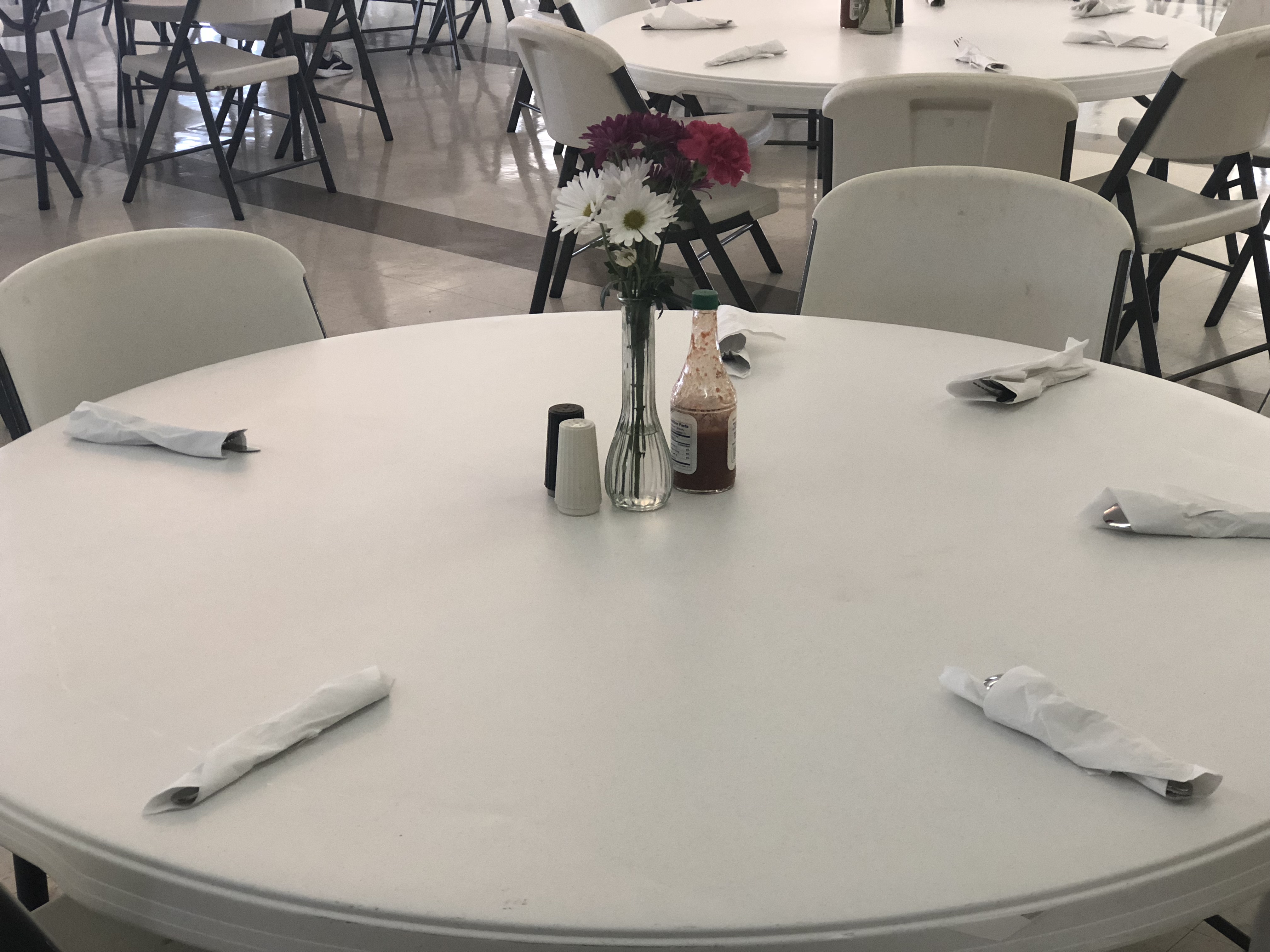

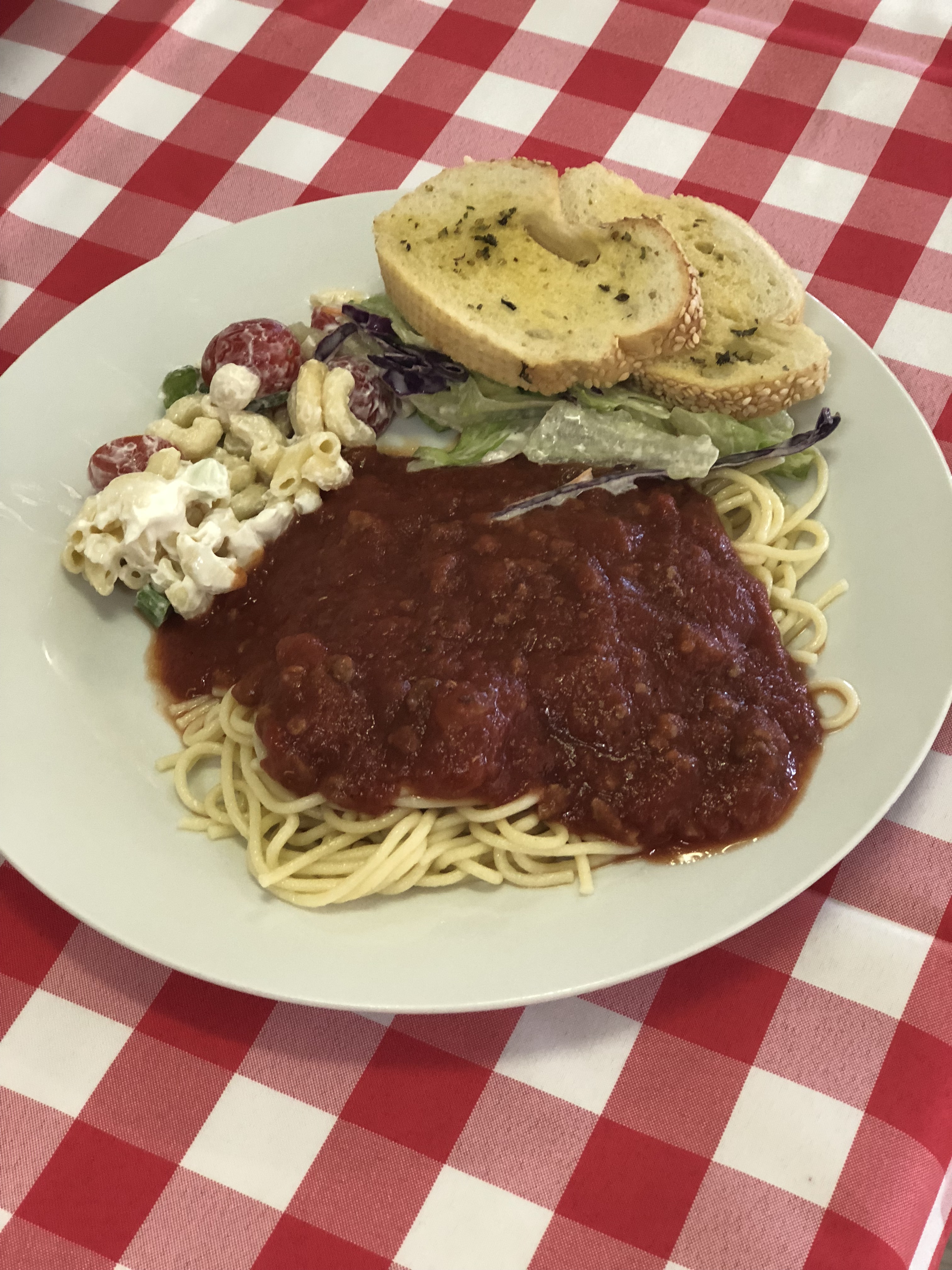

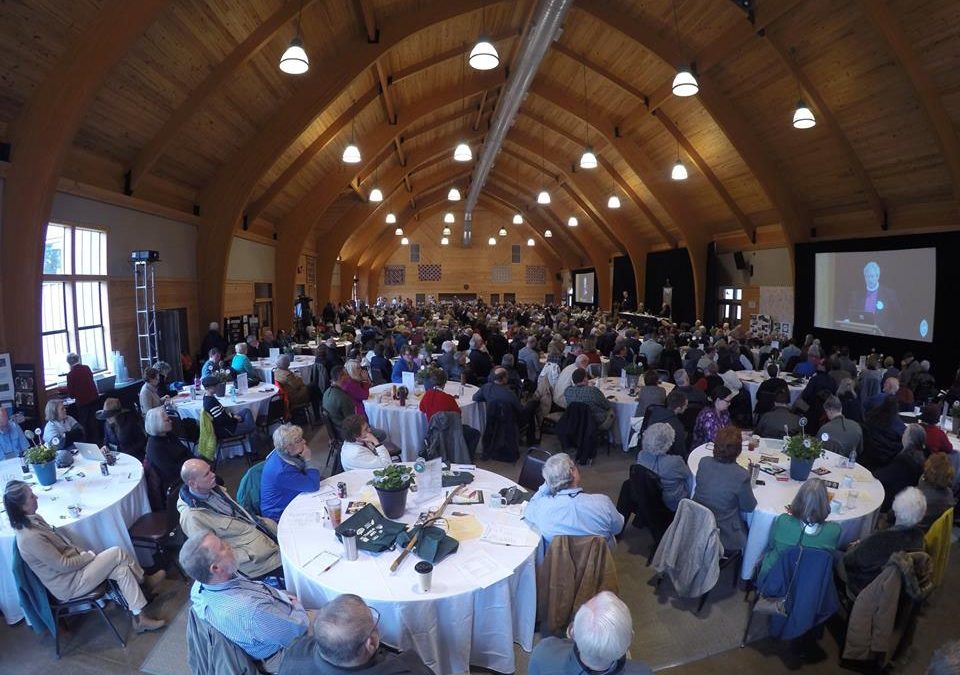
Diocesan Convention 2019
Sermon preached on Sunday, Feb. 10, 2019 by the Rev. Dr. Andrew C. Keyse:
I bring you greetings from our brothers and sisters across the diocese as we gathered February 8-9 at Camp McDowell for the 188th Convention of the Diocese of Alabama. This is the second time we have gathered at Camp since Bethany Village was built. We were welcomed on Friday by the large and enthusiastic Camp staff who always do such a wonderful job of taking care of us and all Camp guests. We were introduced to the new Executive Director of Camp McDowell, the Rev. Corey Jones, currently Priest-in-Charge at St. Francis, Indian Springs. Some of you may be familiar with Corey. He has been a fixture at Camp for many years, whether in Summer Camp or other events. He has Camp in his blood and will do a nice job.
We were then greeted by the Rt. Rev. J. Neil Alexander, Dean of the School of Theology at Sewanee. Dean Alexander came to thank us for all the support of the diocese for our University. It always strikes me a funny to hear it referred to as “our” university, but we have to remember that it is. We, as a parish in an owning diocese, are part owners of the University of the South, and it is our responsibility to help support this wonderful institution of higher education and seminary training. The Dean thanked us for our support, updated us about all the good things happening on the Mountain right now, and then thanked us for the model we give the Church in what we do at Camp McDowell. He called Camp the “Gold Standard” of Episcopal Camps and Conference Centers, and we should be quite proud of it. He said we, both the Diocese of Alabama and Camp McDowell, are the envy of other dioceses around the church.
The Rt. Rev. Ambrose Gumbs, Bishop of the Virgin Islands, was there and thanked us for our Companion Diocesan relationship. He updated us on what was going on in the diocese and invited us to come and be a part of all they are doing. They are still rebuilding and recovering in the aftermath of Hurricane Michael, and we have been a big part of that recovery. One of our resolutions at Convention renewed our Companion Diocese relationship for another three years.
The theme for this year’s Convention was the Stewardship of Creation. It was year three of a three-year cycle. On Friday afternoon we heard from our Key Note speaker, Prof. Jim McClintock, a marine ecologist professor from UAB, author of Lost Antarctica, who has spent over 20 years working at the U.S. Palmer Station in Antarctica. He continues to work there even now. His presentation included a slide show dealing with climate change and the things that are happening in Antarctica. He said the temperatures are warming, glaciers are melting, ice sheets are getting smaller, and how the penguin population has changed over the years due to the warmer climate. It was all very interesting and he was a great speaker. He also told us things we can do to help the environment, and added some good news in that the hole in the ozone layer was shrinking due to our change in making refrigerants. He said the hold should be repaired by mid-century.
On Saturday we had the bishop’s address. Just as Kee likes to do, he told us a story, and said maybe it was one we hadn’t heard before. He told us a story having to do with his own calling. This story began with a calling to a parish in Mississippi early in his ministry. He said shortly after he started there he was met by a woman who had been at that parish for a long time. In a very opinionated and, I’m sure in her mind a loving way, she reminded Kee that this was not his church. Kee said he took that to mean she thought it was her church, but he didn’t tell her that! The point that came out of that is that it is not his church, or her church, or our church – it is God’s church, and we are simply stewards of it, and it is a privilege to serve. We are stewards of what we are given here in our own churches, stewards of what we do in this place, and it’s up to us. Kee said if we think of our work in the church as an obligation, as something we feel we have to do but may not want to do…if we see it that way, we are doomed to fail. We are to be stewards in what we are given in this parish. We are the ones who make it live and breathe and act in this community, and in the world. We are stewards of that, but we also need to be stewards of the earth. The earth does not belong to us, it is God’s as well, and we are to be good stewards of creation. Kee said being stewards of creation is not a political choice, it is serving God, and it needs to be our privilege to care for it…a privilege we share.
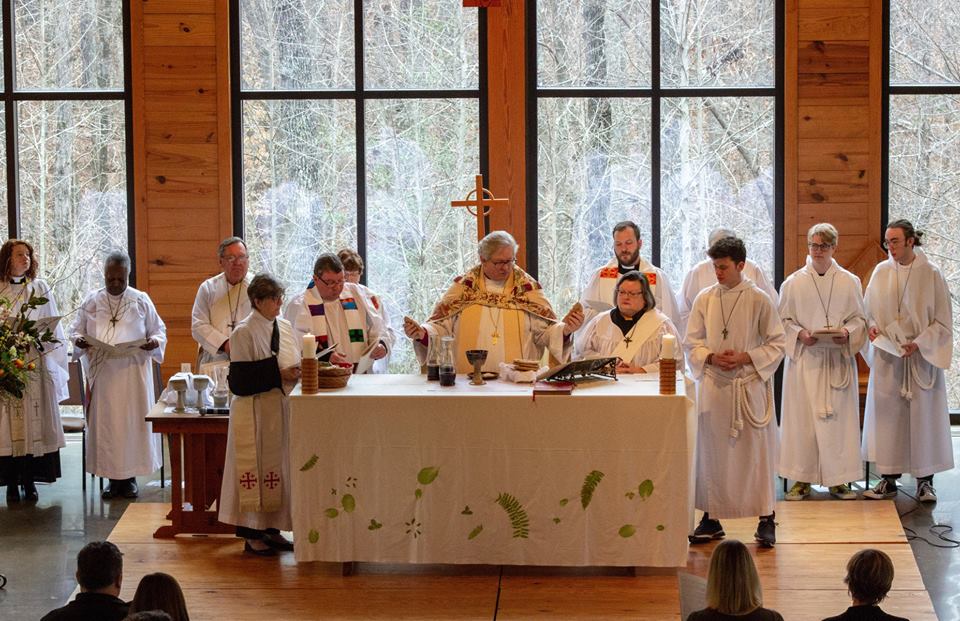
He then thanked the clergy, the clergy spouses and children for, mostly, putting up with the clergy. Tension does exist in the church, he said, changes do happen. The church we received from our parents and grandparents is not the same church we will hand down to our children and grandchildren. The world is not the same and change is faster than ever. How do we adapt the church for our times and still be stewards in an Episcopal way? Then he said the lines he likes to say in his blessing, the one almost exactly like the one Callie and I use. He said hold fast to that which is good, sing to the Lord a new song. We have to learn to adapt while still being good stewards of who we are, stewards of what God has given us. He said change happens. At this point we all began to squirm in our seats a little because we felt like something was coming…and then it did. Kee said sometimes change is needed, sometimes new energy is needed, and he called for the election of a Bishop Co-adjutor to succeed him when he steps down at the end of 2020. But, he said, that doesn’t mean I’m a lame duck. I’m still the bishop, and will be through the end of 2020, and call upon the Standing Committee of the Diocese to form a search committee to help elect the 12th Bishop of the Diocese of Alabama. At this point I immediately thought, as one who serves on the Standing Committee, that I’ll have to drive to Birmingham a lot more often now! And I will. Kee met with us after the Convention to explain to us how it will go. The Standing Committee is made up of four clergy and four lay people representing all districts of the Diocese. We will begin meeting with a consultant from the National Church, the Rt. Rev. Todd Ousley, and then choose a Chair for the Bishop Search Committee. Working with that Chair we will form the search committee itself and then we will step out of the way and let them do their work. They will then work to choose the candidates who will stand for election as Bishop. Right now we’re not sure how long all that will take, or when the election will be. It may be at next year’s Convention or it may be earlier or later. I will keep you posted as to the progress of this committee. There is hope that there will be some overlap and the Co-adjutor will get to work with Kee before his retirement. Co-adjutor simply means the election of a bishop who will become the diocesan bishop once that bishop retires. We are all called, he said, to be good stewards of all that we are given by God. We are called to be stewards in God’s church, God’s earth, and as stewards it is our privilege to serve.
Photos courtesy of The Episcopal Diocese of Alabama.
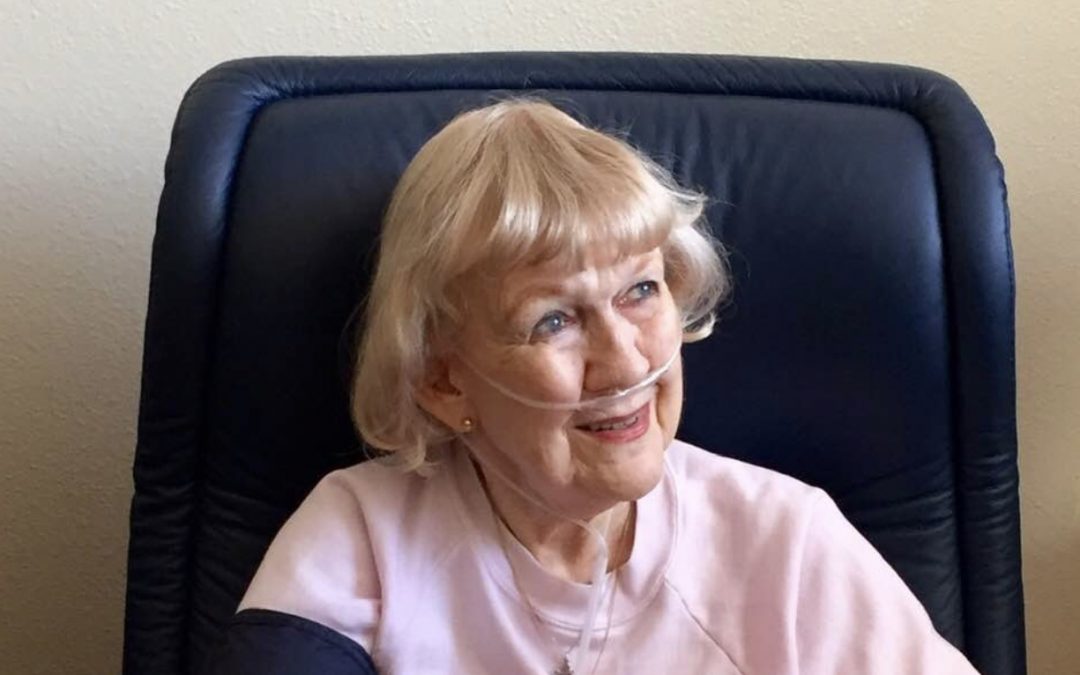
Easter Day for Nancy Johnston
Readings: Is. 25: 6-9; Rev. 21: 2-7; Jn. 5: 24-27.
In the passage from John’s gospel that we just heard, Jesus assures us that whoever believes in the Father and hears the Son has eternal life and that the passage that looks to us like the end of life is a passage from time into eternal life. This is the central promise of Christ: death is not the end; life in Christ is eternal life. He is the Alpha and the Omega, the beginning and the end. In a few minutes during our Eucharistic service, all of us will briefly interrupt the priest’s prayer of consecration and say together “we remember his death; we proclaim his resurrection; we await his coming in glory.” In another form of the liturgy we put it differently: “Christ has died; Christ is risen; Christ will come again.” Past, present, and future, all of time and eternity. But it is all too easy for us to fix our attention on memory and hope and forget the present. We remember Christ’s death long ago. We hope in his return in the future. But do we meditate on his presence with us right now? The missing piece of an active faith is the understanding of the presentness of the Resurrection.
To the thirsty God will give the water of life, and death shall be no more. Who was ever thirstier for the water of life than Nancy Johnston? Nancy was committed to her family, her friends, and her church, this church, where she was married, baptized her children, and where we will today inter her ashes. Hers was a complete Christian life led in that sure and certain hope we refer to in our liturgy. She did not change with the winds of fortune; in the forty years we were friends she was the same person, constant in her affections and her convictions. She was not a Sunday Christian. For years she was part of our little group saying the Daily Office in the chapel here. When she could no longer drive, she asked me to pick her up and take her with me.
Nancy led a life bathed in words and music. One of the first things that impressed me about her was that in the choir, she would stand cradling the hymnal at her waist but never looking down at the words or the music. Now I could understand memorizing the first verse of familiar hymns, and maybe the second. But she even knew the third and fourth verses by heart, words and music. When I told that memory to Sheila Shelton, who stood next to her in the choir, she said Yes, and she wasn’t even singing the melody; she was singing the alto part!
Humility came naturally to Nancy. She could have gone to a conservatory and had a career as a concert pianist, but she fell in love with an English professor named Al and came from Kentucky to Florence and taught piano to children. Her pride was reserved entirely for her family. She herself never sought notice. When she played as an accompanist for a show, she took no curtain calls. Most members of this parish were unaware that she regularly found out who was ill or homebound and visited them. She was famous among her close friends for her anonymous early morning birthday calls with Happy Birthday playing on a music box or a pennywhistle, and she was known for her little self-deprecating poems, written out longhand and slipped to her friends on their birthdays. She referred to herself as a poetaster, not a poet. She always remembered my birthday because it was December 16th, which was also Al’s birthday. Here is a typically modest one full of punning word-play that I saved from 1997:
My muse was not much — amused —
At my last poetic endeavor;
Said she, “You can not be excused”
And with me all ties she did sever.
So, now I’m alone and – bemused —
Of a way to say Happy Birthday,
And now that you’ve this perused,
You can see why my Muse flew away.
This poetic custom provoked retaliation of course. When she retired from Trinity’s choir after forty years or so it was on her 70th birthday, three score years and ten. So I sent her this on February 16, 2001. The more you know A E. Housman’s poetry, the more – amusing – this will be to you. Housman was one of her favorite poets:
Blondest of friends, our Nancy now
Is hung with crape and furrowed brow,
And not herself. Her thoughts may rove
To Housman poems by the drove.
For of her threescore years and ten
How many will not come again?
She dare not think the question through;
But mock her not, ‘twill come to you!
I hold that music, anthems sung,
And verse remembered keep her young,
And springs will pass, and out she’ll go
To see the cherry hung with snow.
Nancy lived the life complete, with both the words and the music. For years she volunteered with the Reading Aides teaching illiterate adults how to read. Many of her friends will remember her ability to recall whole stanzas of poems and passages of Shakespeare. She came by it honestly, as Maggie, her mother would never use a ten-cent word when a fifty-cent word would do. She often told the story of going to Rogers department store with her Maggie, who was nearly a hundred years old, and who was looking for some lotion containing aloe. After having made the poor young clerk bring out all sorts of lotions and find out for her which contained the most aloe, Maggie picked up the lotion, looked at the clerk, and asked “but can you attest to its efficacy?” The poor fellow got this blank look on his face. He had no idea what she was asking. Seeing the problem, Nancy translated for her mother: “She means, Does it work?”
She made lists of words of particular types. She was fascinated for years with words with disyllabic stress changes. The same two-syllable English word used as a noun and an adjective or a verb will shift the stress from one syllable to the other: perfect and perfect, or conduct and conduct for example. She would call me up excited when she had found a new pair. And I still have a long list of double words she assembled like mumbo-jumbo, hanky-panky, harem-scarem, okey-dokey, willy-nilly, and razzle-dazzle.
Even before she left her home on Oakwood Circle for Merrill Gardens, now Renaissance, she made use of the new technology of e-mail mainly for finding out more about words. Here are some of the questions I found among my old e-mails.
“Why are ladybugs called ladies? There must be a few gentleman bugs around.”
“Hi, Tom. What’s the background of cahoots? As in, she was in cahoots with her. Have I asked you this before?”
“How did we come to be ‘out of kilter’ which I am today.
Or I was asked to identify the source of some line of poetry that was running through her head separated from its context. Another e-mail in my collection: “From what is this the first line? ‘The breaking waves dashed high/On a stern and rock-bound coast.’”
Sometimes it was just the quotation and the question: where is this from was understood
“Full many a flower is born to blush unseen
And waste its sweetness on the desert air.”
The very last question she asked me I will always remember. It was just a couple of days before she died. She was so weak she could not use the keyboard so she asked Margie to ask me. What is the story behind ‘caterwauling’? Here is a woman at the end of her life who can scarcely breathe, and she is so far from being morose or afraid of dying that her big concern is to discover something she didn’t know about a strange word,
Poetry is merely words so arranged so that if one were to be altered, the whole would be diminished. The words and the music fitted perfectly together makes a song that endures in our hearts. Nancy’s life was a life full of poetry and music, a song complete. Her life was a life of love of poetry and music given freely to family and to church. Of her three children, one is a fine poet, one is a talented church musician, and one was consecrated a bishop in the National Cathedral. Each of them is compounded in differing proportions of the elements of Nancy’s life. She still lives in her family and her ashes will now rest in this church.
The final office in the Book of Common Prayer before day’s end is Compline. It begins “The Lord Almighty grant us a peaceful night and a perfect end.” I know no one who had such a perfect end as Nancy Kopp Johnston. Father Andy had anointed her with the oil of unction earlier in the day. She was not afraid at all. She talked about her death matter-of-factly without any fear or trepidation. Dying was part of living, and Christ was waiting for her. At the end, surrounded by her children, every breath an effort, she whispered to them “pray, pray” and died. She was not asking them to pray for her to live but to die. She could do that because she understood and believed in the presentness of the Resurrection. I had been with them all that afternoon but was not there when she died during the night. Margie’s way of telling me that her mother had died was a perfect one-line e-mail message: “Easter Day for Nancy Johnston.”
All this brings me back to our gospel reading. The sure and certain hope in the resurrection to eternal life is the foundation upon which a complete life in faith, a life with the words and the music perfectly matched, can be lived. Such a life is founded on the presentness of the Resurrection. If we think of the Resurrection as only a past or future event, it is irrelevant to us now. And we live in the now. G. K. Chesterton was interviewed by a reporter once and asked what he would do if the risen Christ suddenly appeared and stood behind him on the street, The question was asked as a challenge, of course. Chesterton’s answer was “He is.” “The Resurrection needs to be experienced as present risenness. . . .An awareness of the resurrected Christ banishes meaninglessness.” (Brennan Manning) Despair is not allowed in a life lived in the presentness of the Resurrection. Nancy banished meaninglessness and despair and lived the words, the music — the complete song. Let me close in her own words with a poem she wrote almost exactly 19 years ago, worthy of her beloved Emily Dickinson but inscribed only “To Myself.”
Something friendly is about the grave;
The soft, protecting earth that warms its seed
Folds close about it; its precious secret saves,
And leaves the world to ponder on its need.
The rains that fall so soft, the warming sun,
The host of all the elements conspire
To tell us all is Union – One in One –
The cycle of the Universe entire.
If we could but our fearing doubts resign
To this supernal Force that wills to guide
Us through this earth-bound Form, this part-Design,
To lead us where full Being must reside.
– The Reverend Tom Osborne
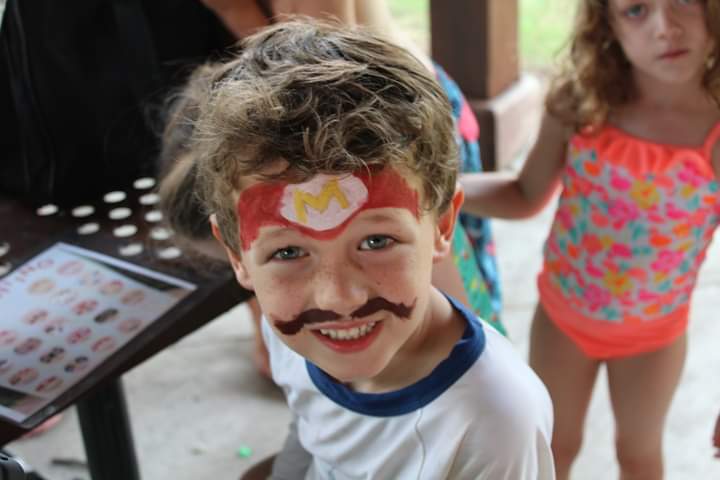
Summer Series @ Trinity Episcopal Church
A couple of years ago, on a Monday morning around 9am a man came in to the front office at Trinity and as he looked around him at the seemingly endless chaos of snack time for 50+ children and he asked our parish administrator what on earth was going on. At the time we had a sweet lady in the office who was a dear friend and she told him that it was “Jessie’s Monday program for the kids”. While this is a phrase I often hear people say, it certainly doesn’t do justice to the countless hours of time that myself and others spend planning and leading programming on Mondays in the summer. And truthfully, while summer series is for the kids, it’s also for the families, for the adult volunteers, and for everyone who wants to be a part of something truly special here at our own Parish. Trinitarians are all about giving back to our community. We do that through the St. Francis project, through our Monday night Community Meal, through our participation in programs like Room in The Inn, and through Summer Series.
One of my favorite chapters in the bible is Mark 4. Mark is a short little book compared to the other gospels and Mark always seems to be in a hurry to say what he has to say (which is a feeling I can sympathize with). In Mark 4, he recalls Jesus telling a parable about sowing the seed. If you have ever planted a garden you well know that even if every seed is planted in ideal ground not all of them will produce anything, much less seeds just thrown willy nilly onto gravel or a ditch somewhere. Later, when the disciples where alone with Jesus they asked him what the story meant. I’m sure they understood the idea of planting seeds but they did not understand how he was making a greater point. Jesus told them that those seeds being planted where the words we are spreading about God’s kingdom. Our words and our actions as Christians are seeds. At times, we plant them knowing full well they will never grow, but we plant them anyway because that is what we are called to do. Summer series, to me, is all about planting the seed of the love of God, love of each other, and a love for the Episcopal church.
Over the last five years this program grew from a seed of an idea that we cobbled together in a brainstorming session one rainy afternoon to something none of us could have foreseen. When I planned that first Summer, we only had about 20 children consistently in attendance each Monday. I think one week we only had 17. There was only one staffed person, Ms. Cathy Turner, and myself. The programming we used was something I modified from a larger publishing company and some things I cobbled together as we went. This last summer we planted seeds with 90 children from 64 families, a dozen youth helpers, 10 paid staff, and countless adult volunteers. Summer Series has grown from a few hours of drop off programming to something we have each Monday, all day. And this summer we are adding Friday mornings. Altogether, Summer Series is 54 hours of programming plus 18 hours for after care, plus Fridays. Summer Series is more time than any child could spend in Sunday school in a year, children’s chapel or during a regular 3-5 day Vacation Bible School. It is almost the same amount of time that they spend at Wednesday night programming throughout an entire fall and spring which means we have such a great opportunity to make an impression or plant a seed with so many children, families and volunteers.
Trinity’s Childrens Summer Series is the single biggest undertaking of the year for children’s ministry. Every Monday, from 8:00am-2:00pm we take in the children of the parish and from the community. We play games, we sing songs, we laugh and learn a little about the kingdom of God and how to spread the love of Jesus to our fellow creatures. With the help of Mr. Bruce and a wonderful kitchen staff as well as parent volunteers we feed them lunch each Monday. I cannot adequately express what a blessing this ministry has been in the community for parents and what a blessing it has been for all of us who get to spend these hours with the funniest, sweetest bunch of little ones you will ever meet. Not only is summer series a wonderful program for the kids who are in it but now we are getting to see some of those kids grow into our future youth volunteers. EYC who started out in that first year with us for Summer Series are now old enough to volunteer, and they do. This is sustainable ministry at its very best.
As I look to this summer one of my biggest goals is to make this program sustainable. I want Summer Series to be something that kids can come here and take part in for years to come. When they are adults, I want them to look back at their summer spent here with a love of the Episcopal church, of God, and of the friends that they made. One of the greatest privileges of my life has been to watch these kids grow every summer, and I hope to be able to do that for years to come. After I’m gone, I hope to leave a program that whoever comes after me can pick right up where I leave off and make it even better. One of the greatest things about being a part of the Episcopal church are our traditions, and I hope this is one tradition that we at Trinity can help to make last and thrive.
This summer our theme is the Beatitudes. We throw the term “blessed” around quite a bit, and this summer we are going to explore who Jesus said was blessed, how we can be a blessing to others, and how we can see the blessings in our own lives. If you want to be a blessing to us and help us to make summer series possible please consider checking out the bulletin board in the Parish hall with items that we would love for you to “bless us” with. You can also pray for the program and its leaders. I can always use more prayer thrown my way, especially as I plan for the summer. This summer we need meal teams on Mondays, so consider putting together a team of your friends and providing a Monday meal. If you are someone who has a love of children and a passion for helping with programs like this, we can always use more volunteers on Mondays and Fridays. In the next few months there will be ample opportunity to come and help decorate a classroom or clean up a supply closet. If you like to organize supplies, test out markers, or slap labels on bins, I can put you to work! Finally, the best way that you can help us is to tell your friends about this program. We are always encouraging people to sign their children up, but we also need summer staff. Go forth and spread the word. Plant the seed, and watch it grow.
Episcopal Young Adults + a Trinity Sweatshirt
I’ve been seeing them all over town. I had lunch with my closest friend, and she had one on. I ran into another friend in Publix, and she had one on. I wore one to see a movie with my children, ran into another Trinity member, and she had one on! What am I talking about? Our Trinity sweatshirts, of course!
Have you seen them? They’re simple, well-made, and really comfortable. Navy blue with a single word across the chest: “Trinity.” ‘Nuff said, as they say. When I see us out and about in those sweatshirts, I see people declaring how they feel about Trinity. I see people saying, We love this parish. We love being a part of it. Trinity is a place of shelter and safety. It’s a place that feeds us and gives us strength through worship, through service, through prayer, and through friendships. Being part of this community means that we’re part of a longstanding tradition of feeding, giving to, and loving others.
Seeing other people wearing their Trinity sweatshirt when I’m wearing mine is wonderful to me. Any other item of clothing I’d probably be embarrassed to see someone else wearing at the same time. But there’s instant camaraderie when I see someone else with this sweatshirt on. If you don’t have one, you should get one. The young adult group at Trinity worked on the design, and they’re the ones selling them. For the first round of sweatshirts, the proceeds went to the St. Francis Fund. For the next round the proceeds will go to some of the service projects the young adults want to get involved in this year. So come by the office with your cash or check, and get your name on the list to get one. They’ll be printed at the end of January, so you won’t have to wait long.
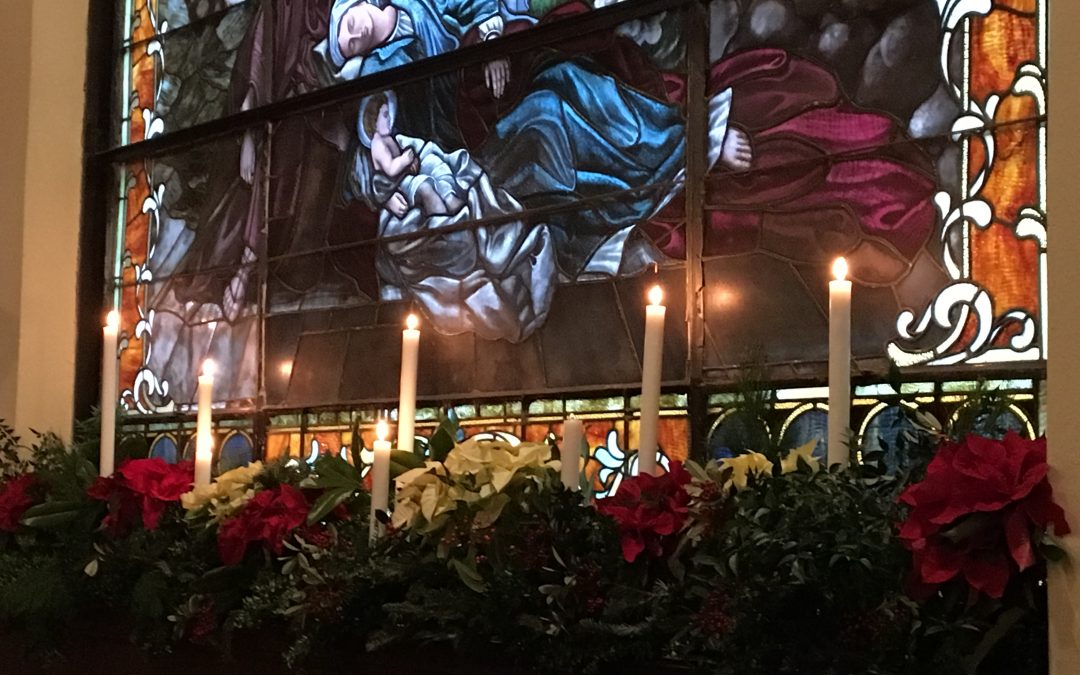
Christmas Eve at Trinity
Christmas Eve at Trinity…
One of the highlights of my Christmas is worship on Christmas Eve. I love the pews packed with wriggling, bright-eyed children at the 5 p.m. service. I love the hushed, candlelit crowd gathered for the late service. I love singing every single verse of my favorite Christmas carols. I love the candles. I love hearing the story of the birth of Jesus and the wonder of the shepherds when they found him and his family in Bethlehem. In that hushed, holy service, it seems to me that we’re listening to that story with all the generations of Christians that have gone before us gathered all around us. I even love that we pull out the incense on Christmas Eve. “Holy smoke” was one of the ancient signs that God was present in the stories of the Bible (Exodus 19:18 and Mark 9:7 are two examples of this). Our incense signifies to us the presence of God. It may smell strange and get caught in our throats, but there’s something otherworldly and wonderful about it, too.
Our beautiful and meaningful Christmas Eve services bring in a number of people who don’t regularly attend an Episcopal Church. If you know someone who’s thinking about worshipping with us at 5 or 11 p.m. this Christmas Eve and think that person might have some questions about how we worship or what to expect, here are a few pieces of information you might pass on to them, along with a heads up about incense, of course.
- Lots of churches feature a podium or a pulpit as the focal point of the worship space. In the Episcopal Church, you’ll see a large table — an altar — is the most significant feature inside the worship space. The pulpit is pretty prominent, too, but that altar is what most people notice first. While some altars are made of stone, ours at Trinity is made of wood. The priest stands behind the altar, facing the congregation, to celebrate communion. The altar is the focal point of the church because communion is so important to us.
- Communion (the Eucharist): this is another really important thing to know about Episcopal worship. We love to take communion together. We believe it brings us closer to God and each other every time we take it. We believe that the bread and wine (yes, it’s really wine and not grape juice) can nourish and sustain and transform us. Are they the literal body and blood of Jesus? We don’t believe so, but we do believe that Jesus Christ is really present in the bread and the wine and that the bread and the wine are able to feed us in a way that regular old bread and wine can’t. While there’s a difference of opinion among Episcopalians about whether non-Christians should take communion or not, we do agree that all Christians, regardless of denominational affiliation, should take communion together.
- When you sit in a pew in an Episcopal Church, you’ ll find at least two different books in the racks attached to the pew in front of you: a Hymnal and The Book of Common Prayer (BCP). There may be a Bible there as well, but there will certainly be a Hymnal and a BCP. Does this mean that the BCP is more important to us than the Bible? Well, if you take a look inside a BCP you’ll see that the BCP contains all of the psalms, is packed with citations of and references to the Bible. The BCP is our book of worship, and we worship using the language and the models given to us in the Bible. The BCP contains our service for celebrating communion together. It contains services for marriage, burial, ordination. There are special services for Ash Wednesday, Good Friday, and Easter. We know that the BCP is new to most folks who worship with us for the first time, so Trinity members are always willing to help out a newcomer, and we do have a worship bulletin that has most of the service printed in it as well as the corresponding pages in the BCP that we hope will help as well.
Another thing you’ll notice in our pews is that attached to the underside of the pew in front of you is a kneeler. In the Episcopal Church we stand or kneel to pray, kneel to confess our sins, and stand to sing. Sometimes we call all that standing, sitting, and kneeling ““pew aerobics.” It’s not required, and it’s highly unlikely anyone would even look at you twice if you didn’t kneel. The point is that if you reach out under the pew in front of you and pull that kneeler — carefully — toward you, you will find a relatively comfortable place to kneel if you so choose.
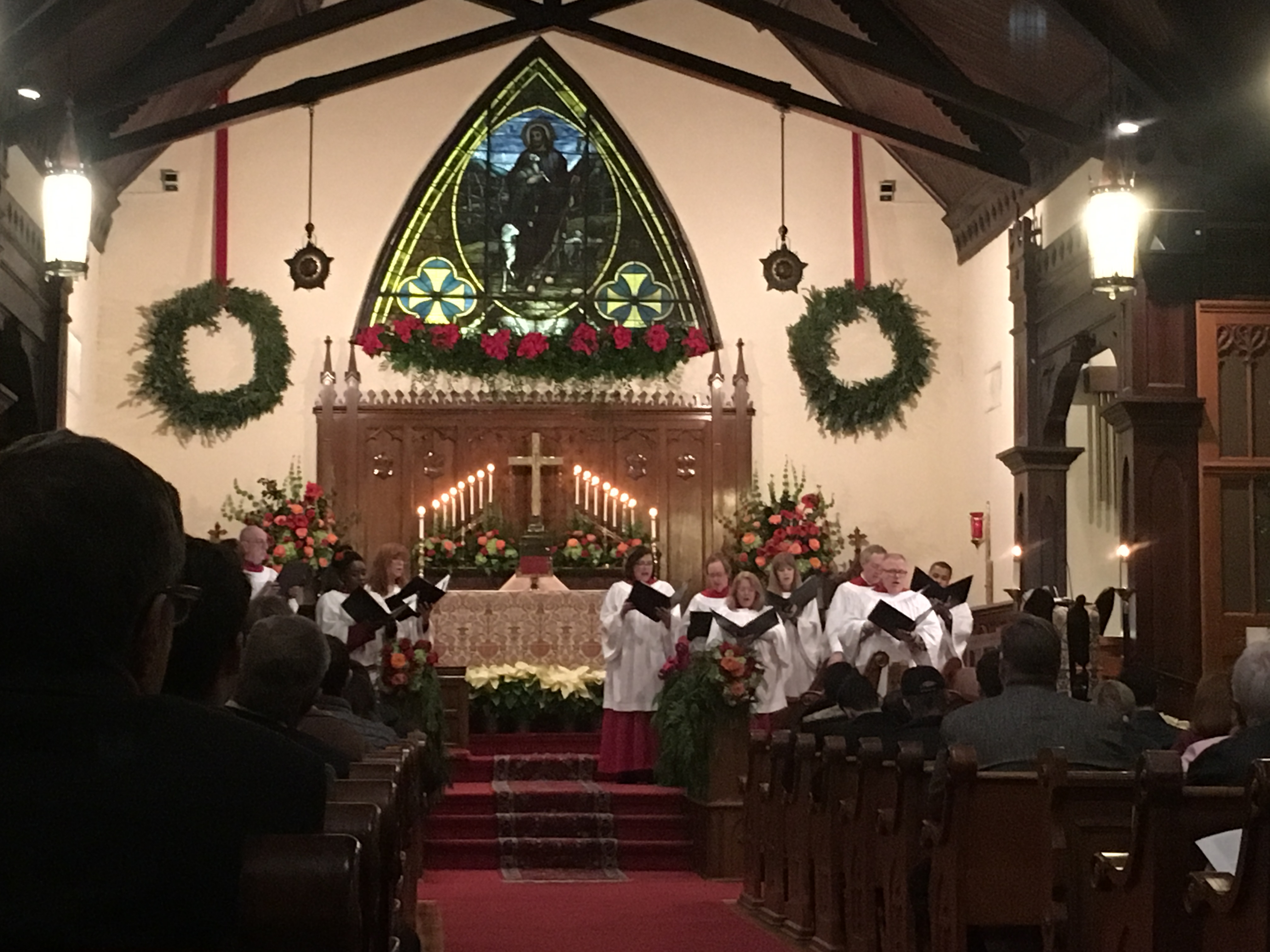
Whether you are able to worship with us or not, we at Trinity hope that you have a holy and meaningful Christmas. We pray that you may feel that God is truly present in this world and that knowing the nearness of God will bring you healing, strength, and Christmas joy.
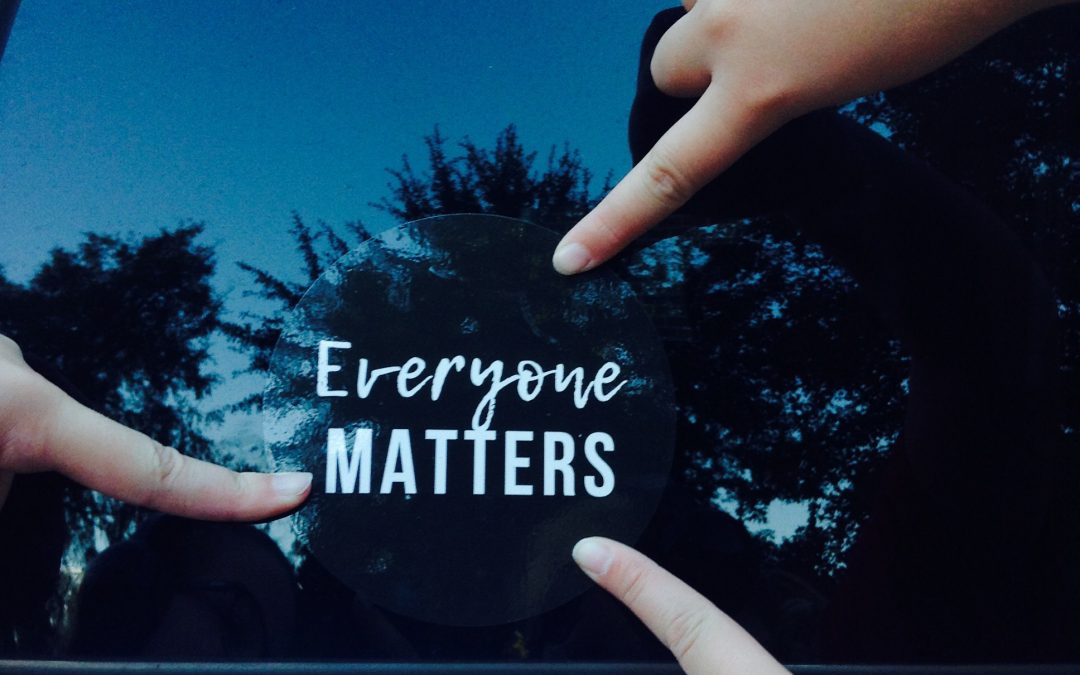
Everyone Matters
Have you ever walked through a crowd of people, maybe in a mall, or downtown while shopping, or even at an event, and felt like no one even noticed that you were there? People avoided eye contact, and were either too occupied with the person they were with, or maybe on their phone, and they walked right past you without acknowledging you exist.
I remember that feeling well. I would walk down the street when I was a homeless kid, and see people look right through me, or a give me a glance of pity and then quickly look away. Sometimes I could see their face wrinkle up in response to how bad I smelled but they would try to hide it. Sometimes, they didn’t even try to hide it at all, and I could see them point and talk about me.
Those interactions are some of the most deeply imprinted memories of my time being homeless. The idea that I was either invisible, or even worse – disgusting to others. It stays with me every day. I don’t even know how to articulate how it felt to be invisible. I felt worthless and like my life was unimportant to the world. I felt like I didn’t matter at all.
For me, the holidays magnified many of these thoughts and hurts. When November rolled around, the “do I even matter” seemed to get worse. When you don’t have the same experiences of a “normal” person growing up – things like family, traditions, a stable household, extended relatives and holiday dinners and “every Thursday before Christmas, we go over to Uncle Rich’s house and suffer through a weird family potluck” kind of experience, you have a different kind of longing during the holidays. You may have fixed some of the outside things you were missing – maybe you now have your own family, or have your own house, or now have enough money to do and buy things, but on the inside, those things – like belonging, like knowing someone thinks you matter, like having somewhere to go – those things come back with a vengeance during the holidays. Especially for people who are homeless. All of the commercials and advertisements everywhere you turn are screaming the message of tradition and family and welcome home. That message tears at the wounds that are deep inside. Wounds that remind you that you don’t have a place to go – that you don’t belong anywhere. That you don’t matter. They make you feel invisible all over again. This causes a deep grief and pain that leads to bitterness and anger towards people who have never even realized what they have. It made me angry at my friends when they would complain about their family and how annoying family events were. It made me secretly sob when commercials would come on that reminded me of my childhood. It has made me overdo the holidays, trying to erase those feelings. And finally, it pushed me to try and help others so they don’t have to experience the same thing. It’s given me compassion for those whose pain I see and recognize, especially during Christmas time.
One night I was lying in bed, and I remember thinking that if only everyone knew that they mattered and then treated others that way, that so many of the problems of the world would be solvable. I wondered if others struggled with feeling like they didn’t matter or if it was just me. It was then that I felt this urgency to figure out how to convey the message that everyone matters. I wanted to put that message out there and have it spread far and wide because then maybe no one else would have to lie awake at night and wonder.
It seems like questioning if we matter gets a little more common in the month of December. Or maybe it’s just because we stretch ourselves so thin and go a little crazy trying to create some magical moment that we lose our ability to really connect with each other.
In a world where human connection is increasingly fragile, the holidays can feel like an expensive social experiment gone wrong. We create these forced, false environments where everything is supposed to be magical and beautiful and steeped in tradition, yet we are frantic and exhausted and tucking our true feelings about it all behind the couch with all the clean laundry that needs to be folded before company comes over. This time of year can leave you feeling disconnected from life. Magnifying feelings of inadequacy and loneliness, and leave you wondering why you don’t seem to have the same joy that everyone else has.
Spending the holidays with my homeless friends has always been a yin/yang experience for me. I acutely remember how painful the first Christmas I spent alone was. I remember being young enough that I still kind of wanted Santa and the hot chocolate and the stockings, yet trying hard to pretend that it was all annoying and I didn’t care. I spent the day in a shelter with a large group of people. We ate a “holiday” meal, but it was really just green beans, mashed potatoes and ham sandwiches on red plastic plates. There were attempts to make it festive, but the overall air in the room was one of anger, sadness and resignation. There was a forced joviality with the canned Christmas music playing and workers wearing cheap red Santa hats who weren’t any different than the day before. I would have preferred to pretend like the whole thing wasn’t even happening. Those experiences made me strongly dislike the holidays for a very long time. It was as if we couldn’t go off script and acknowledge this holiday thing we had created wasn’t made equal for everyone. I think of how everyone wants to help those in need during December and often wonder where those same people are in February when the cold and loneliness still linger.
Maybe instead of green bean casserole and cheap, red felt Santa hats, we should focus on just sitting and connecting with each other. Learning what happy traditions are for each other and celebrating those instead. Maybe you hate eggnog, but love strawberry milkshakes. Or maybe instead of ham and green beans, you love “brinner” (you know, breakfast for dinner). Or grilled cheese sandwiches. Or maybe you like heavy metal or bluegrass music instead of Christmas music. We should be celebrating whatever brings you comfort and joy and warm memories. Not the forced ideas of what the holidays are supposed to mean. That would actually be something nice to look forward to each year.
Creating human connection requires intentional thinking. It means going outside of the box, creating your own playbook for how you want to experience life. To forge deep, meaningful connections with one another, we have to spend the time. Listening, talking, sharing, laughing, crying, breaking bread together. It means making the mundane important. Sitting at a kitchen table while dishes are being done, or putting up the Christmas tree and a million ornaments together AFTER Christmas is over. It’s running errands with a friend so that you have the 20 minutes in the car together. It’s the time spent together on the thousands of little tasks that seem unimportant. When we spend this time together – when we strive to create intentional human connection – that’s when I think we experience the holy, sacred moments of life.
What I longed for the most when I was homeless was to just to be normal. To do the simple, basic things that we consider chores; the dishes after dinner, the rituals of getting ready for bed – not at a gas station sink, folding the laundry. I missed the background noise of being in a home – even when it was loud and chaotic.
I missed the human connection.
Whether its helping the homeless, serving the hungry a meal, or sitting with someone we know is struggling, I think the most important thing we can do is try and put ourselves in their shoes. Ask yourself, “What would matter most to me in this moment?” and then do that. Don’t overthink it. Don’t overanalyze it. Just do it. Show up and be present.
This is how we make sure that everyone matters. How everyone feels “seen”. How we spread the love that I believe God created us for to spread. This is how we keep someone from laying in bed at night wondering if they matter. Or sitting in a crowded church service wondering if anybody cares that they exist. We SEE each other. Whether they are homeless and dirty or hungry and ashamed to be eating at a community meal, or sitting at the dining room table alone in a beautiful, custom built home surrounded by nice things, we take the time to look for them and SEE them where they are.
Once you start letting the invisible become visible, you see things differently. I often say that once you know homeless people exist you can never “un-see” them. This is true of each other. Once we “see” the humanity in each other – our pain, our hurt, our joy – our real selves, then we can’t un-see that. And maybe you even recognize some of it. And you carry that knowledge around with you forever.
You then have two choices: You can continue to serve them green beans with cheap, red felt Santa hats and pretend like that’s what they want OR you can sit down and figure out what actually brings the joy and peace to them that we want the holidays to bring. We can begin the journey of creating intentional connection with each other and not only add meaning to the holidays, but maybe even find our way back to each other and begin to heal some of our wounds.
If we keep doing that twelve months a year instead of only 25 days in December, it will take us all the way home.
– Krista Manchester
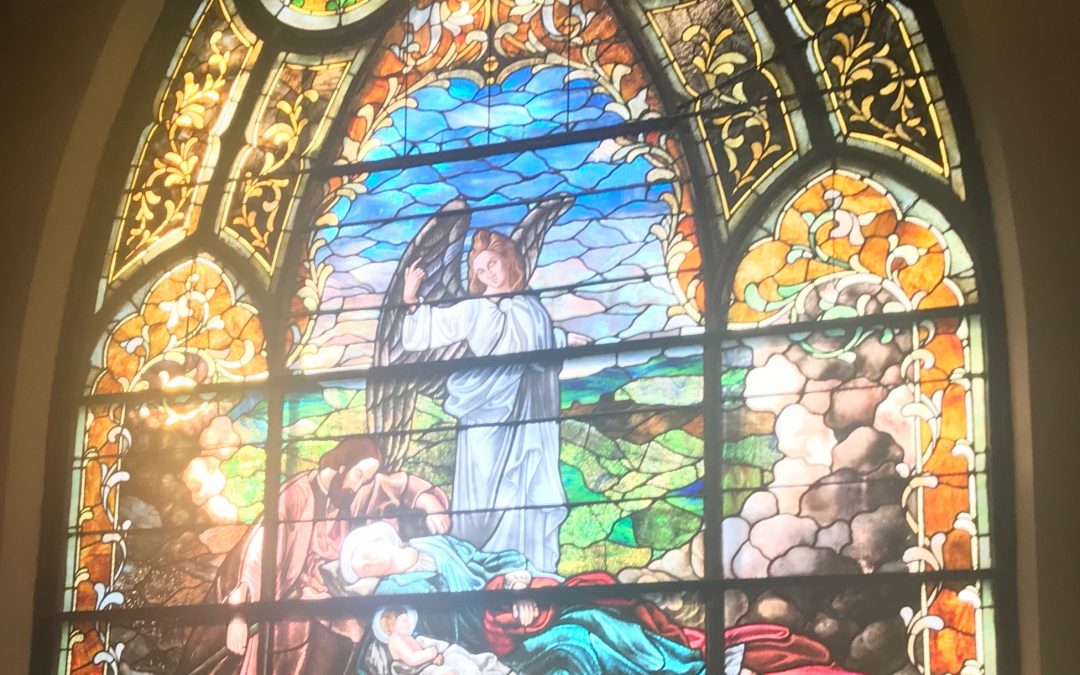
Longing for God
The season of Advent is one of the most beautiful in the Christian tradition, but it can be overwhelming. With all the shopping, feasting and visiting with friends and family we forget how it all began. By the time Christmas arrives we often find ourselves exhausted and eager to move on to the new year. It’s no surprise that we feel a sense of longing for something more, something that will restore us to the true wonder of the occasion, of the moment when the Divine became human and lived among us. How can we recover what has been lost? How can we answer that longing?
God also experiences longing. When we are suffering God longs to heal us. This longing was so strong that it created an event that split time and changed the course of history. Saint Paul the apostle wrote eloquently about it in his letter to the Philippians. He said that Christ:
who, though he was in the form of God,
did not regard equality with God
as something to be exploited,
but emptied himself,
taking the form of a slave,
being born in human likeness.
So, in our longing, we are like God. We long to return to the source from which we came. As we move into the intensity of the season and look for ways to resolve that longing there are things all of us can do that will bring us closer to God. They are simple and close at hand.
First, we can participate in communion as often as possible. If we pay close attention to the words that are said and sung during the communion service we will hear God longing to be united with us. By taking the bread and wine we welcome God directly into our bodies and our lives. For a few minutes we set our selves aside, “empty” ourselves, and surrender to the presence of God.
Another way we can answer the call of our longing is simply to sit in a comfortable place, close our eyes, focus on a word that is sacred to us, and let go of all the day’s activities. This practice is usually referred to as centering prayer and comes from a Christian tradition that is almost as ancient as Christianity itself. Learn more about centering prayer here.
Centering prayer can also be practiced in other ways. For example, our deacon Catherine reminded us recently that her practice of centering prayer is knitting. She often knits while she chats with friends or leads a class on ministry. It centers her. It gives her repose and stillness. In that stillness she becomes more aware of the divine presence
In our daily routines, despite the rush, there is always a way to ease our longing for God because, in truth, God is always present. We just have to remember to pay attention.
All humans experience longing on a daily basis. We all long for something, someone or some experience that will make us feel complete. Many times these things are forever beyond our reach. But the truest experience of completion comes from the deepest experience of longing – that longing to be at home with the source of all existence. That experience is available to all of us because everyone carries within the spirit of the one who made us. In reality, that spirit is who we truly are. All that is required is that we set our daily selves aside and listen to that still, small voice whispering in the silence. It reminds us that we are loved completely and unconditionally. What better way to celebrate Christ’s arrival than to spend a few seconds in the warmth of His embrace?
– Jake Berry
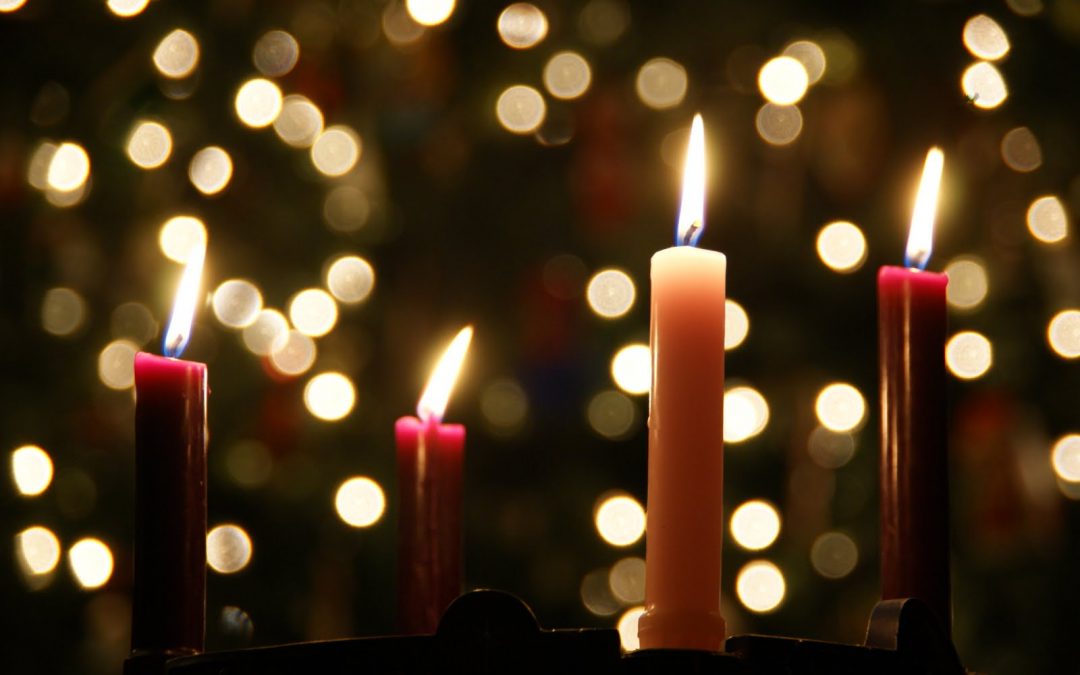
Preparing for Advent
Welcome to our Trinity blog! We’ve launched it today, on this first day of Advent, because Advent marks the beginning of a new church year. We thought, why not start a new year with a new project? Our goal is to share the beautiful work that God is doing in our Trinity community through this blog. Sometimes the blog entries will be about church activities. Sometimes they’ll be about what we’re doing in worship. Sometimes they’ll be about the Bible or music. Sometimes, they’ll be written by the church staff. Sometimes, they’ll be written by church members. We’ve got a parish packed with talented, wonderful people, and we’re excited to give you readers a chance to get to know them through their writing.
We’re starting this blog with some thoughts from members of our congregation on what the season of Advent means to them. What is Advent, you say? Well, Advent comes from the Latin word adventus, which means “coming” or “arrival.” Originally, Adventus was a festival celebrated — often in Rome — to mark the arrival of an emperor back to the city after a military campaign. In the Christian church, Advent came to mark the season before Christmas. At Christmas, we celebrate the arrival of Jesus Christ on the earth by celebrating his birth. Advent is the time we anticipate and prepare for his arrival. It’s a season of excitement and hope and preparation.
It’s also a season of reflection. Preparing ourselves for the arrival of Jesus isn’t, after all, about gift giving, decorating, and cookie baking. Not one of those activities is bad. They’re all lovely ways to prepare our homes for Christmas. Advent is about preparing much more than our homes for Christmas. Advent is about preparing ourselves, our hearts and minds, for Christmas. So we light candles and pray. We look within ourselves — at our goodness, yes, but also our empty and broken places — and we long for the healing and the hope that God brings us in Christ Jesus. We also look around and, while we see much that is good and joyful, we also see how many people are without hope, and we pray that Christ will come through us that we might bring healing and hope to others.
Tonight at 5, we’ll have a wonderful Service of Advent Lessons and Carols here at Trinity. We’ll light the candles, read scripture, sing hymns, and pray for the coming of the one who brought and continues to bring so much light and love to our world. Join us for that. Join us on this blog over the next four weeks, and we’ll get truly prepared for Christmas together.
Image credit: The Roman Catholic Diocese of Laredo.
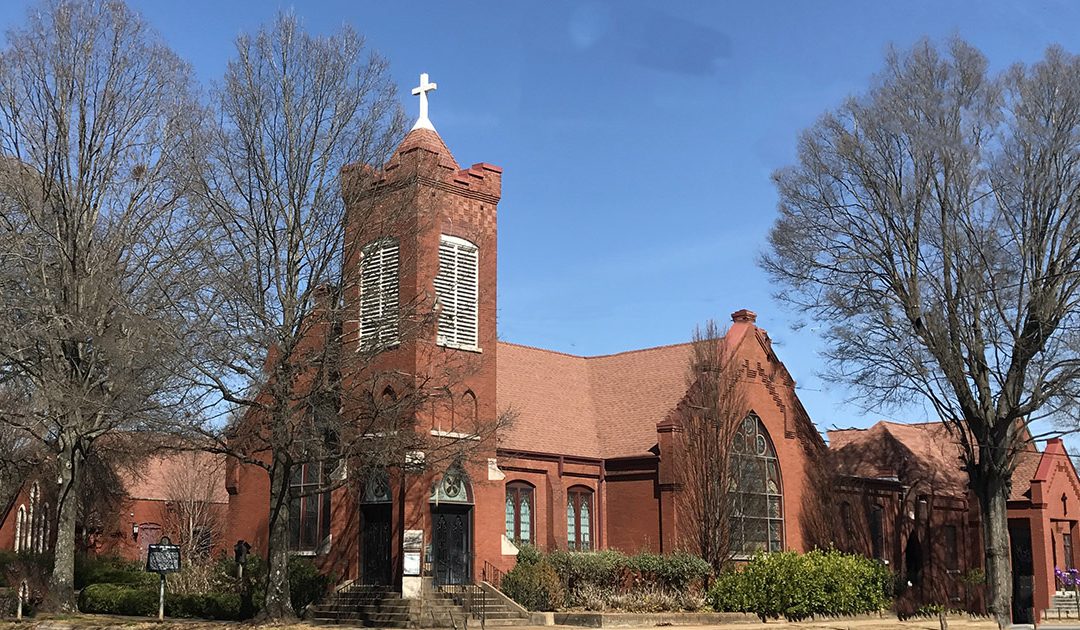
Welcome to Trinity Episcopal Church
Welcome to the blog of Trinity Episcopal Church!
We are part of the Episcopal Branch of the Jesus Movement. We have been a worshipping community in Florence, Alabama since 1824, and our beautiful church has been at the corner of Pine and Tuscaloosa Streets since 1894. As part of the Episcopal Church, we are part of the Anglican Communion in the United States, descended from and partners with the Church of England and the Scottish-Episcopal Church.
What do we believe?
We believe in the loving, liberating, and life-giving God: Father, Son, and Holy Spirit.
We believe in following the teachings of Jesus Christ, whose life, death, and resurrection saved the world.
We have a legacy of inclusion, aspiring to tell and exemplify God’s love for every human being; men and women serve as bishops, priests, and deacons in our church. Laypeople and clergy cooperate as leaders at all levels of our church. Leadership is a gift from God and can be expressed by all people in our church, regardless of sexual identity or orientation.
We believe God loves you. No exceptions.
Want to learn more? Just follow along…
